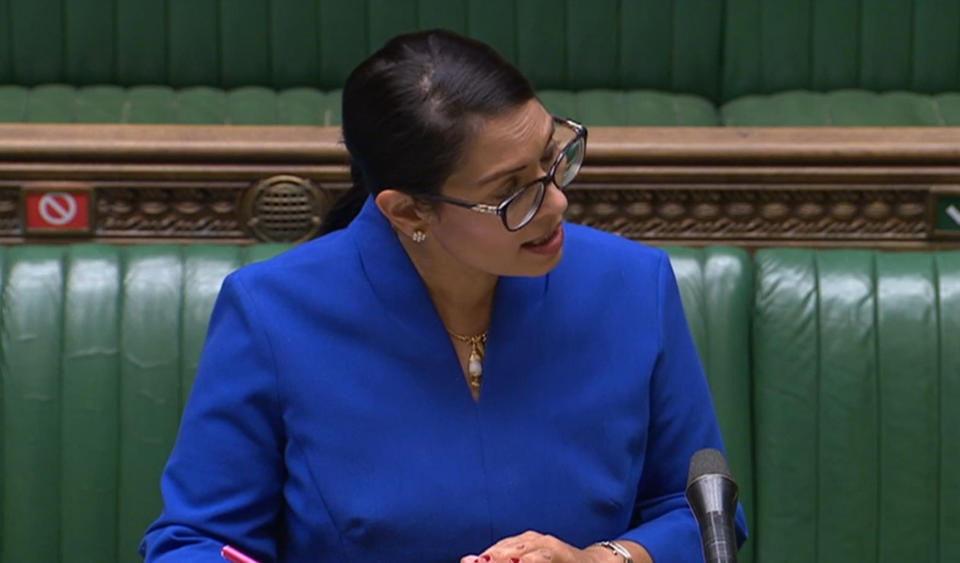How the government's new quarantine travel rules affect you
Home secretary Priti Patel has confirmed most people who travel to England from abroad will be forced to quarantine from Monday.
Announcing the regulations in the House of Commons on Wednesday, Patel said they were “backed by the science” and form a “proportionate approach to protect the health of the British public” amid the coronavirus pandemic.
So, what do the rules mean and how will they be enforced? Yahoo News UK explains all...
Where will the rules apply?
In England. The devolved administrations of Scotland, Wales and Northern Ireland can set their own rules.
What do they mean?
International arrivals by air, sea or train must self-isolate for 14 days, the incubation period of the virus.
Travellers must fill out a “contact locator form” in advance of their journey.
They will be required to provide their full name, sex, date of birth, passport details or other travel documents, phone number, home address, email address, address for self-isolation and planned date of arrival, details of their travel plans and the operators they have booked with.

Any “non-resident nationals” can be refused entry, and also fined £100, by Border Force if they refuse to comply.
Once a person has entered the country, Public Health England – which will be given the contact forms – “will undertake checks”. Anyone suspected of not self-isolating will be reported to the police.
What are the punishments?
Fines for breaches deemed “information” offences start at £100, with the number doubling each time to a maximum £3,200 for the sixth incident. They can be issued by immigration officers as well as police.
For wilfully obstructing someone’s work to enforce the rules, the fine is £1,000.
Patel also said rule-breakers face “potential prosecution”.
Will anyone be exempt?
Road haulage and freight workers, medical professionals travelling to help the coronavirus effort, and seasonal agricultural workers who will self-isolate on the property where they are working are exempt.
No further exemptions, like those mooted for elite athletes and professional sports, have so far been published.
Why is the government introducing these rules 11 weeks after the lockdown was imposed?
Patel told MPs: “At that time, the scientific advice was clear that such measures would have made little difference when domestic transmission was widespread.
“But now, the transmission rate in the UK continues to decline, and international travel is likely to resume from its record low.
“Therefore, the scientific advice is that imported cases of the virus pose a more significant threat to our national effort and our recovery.
“Travellers from overseas, could become a higher proportion of the overall number of infections in the UK and therefore increase the spread of the disease.”
How long will they last for?
Until 29 June at the earliest. The measures will be reviewed every 21 days, and “maintained only for as long as judged necessary”.
Is there any scope for them to be relaxed?
Yes. Patel said “international travel corridors” could be established with countries that are deemed safe, removing the need for the 14-day self-isolation.
Support for these “air bridges” is being driven by fears for travel and tourism businesses.
What will it take for them to be lifted completely?
Patel said the government will consider the rate of infection and transmission internationally, measures implemented by other countries, and levels of imported cases in other countries with more relaxed border measures.

What did MPs say?
Labour’s shadow home secretary Nick Thomas-Symonds told Patel: “If these measures are necessary from 8 June, why have they not been necessary in recent weeks or from when they were first announced by the home secretary herself on 22 May?”
Tory backbencher Theresa Villiers, meanwhile, called for the legislation to be delayed... so people can go on holiday. “Can I urge her, suspend the implementation of this blanket quarantine requirement to give just a few more weeks to get those safe air corridors in place so we can save jobs in aviation and let families go on their summer breaks in the sun?”
Fellow Conservative backbencher Liam Fox echoed Thomas-Symonds as he said: “If such a barrier was required, why was it not introduced earlier in the outbreak?”
Coronavirus: what happened today
Click here to sign up to the latest news, advice and information with our daily Catch-up newsletter
Read more about COVID-19
How to get a coronavirus test if you have symptoms
How easing of lockdown rules affects you
In pictures: How UK school classrooms could look in new normal
How public transport could look after lockdown
How our public spaces will change in the future
Help and advice
Read the full list of official FAQs here
10 tips from the NHS to help deal with anxiety
What to do if you think you have symptoms
How to get help if you've been furloughed



